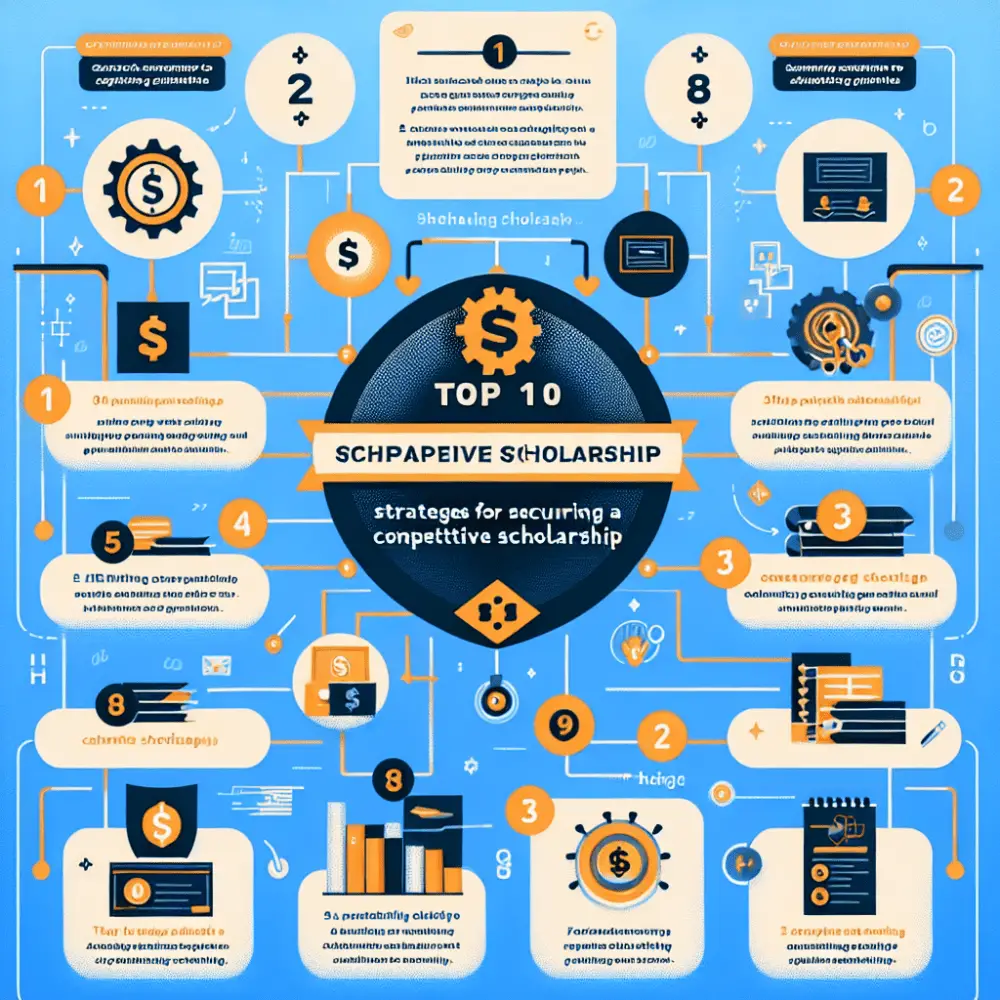
Securing a competitive scholarship can transform one’s education journey and future. Students across the world face tough competition when aiming for these financial aids. However, several strategies can increase the chances of securing a coveted scholarship. Here, we outline the top ten strategies that can help students stand out in the crowded field of scholarship applicants.
1. Start Early
The journey to securing a scholarship begins well before the actual application process. Students who start early tend to have an advantage. Beginning in high school gives students ample time to build a strong academic record, participate in extracurricular activities, and gather necessary recommendation letters. Early preparation also ensures that students take note of various deadlines and requirements well in advance.
2. Research Thoroughly
Comprehensive research is critical. Students need to explore a range of scholarships to find those that best align with their academic achievements, interests, and career goals. Utilizing scholarship databases, school resources, and online search tools can reveal numerous opportunities. It is also essential to pay attention to smaller, less publicized scholarships, as these often have fewer applicants.
3. Maintain Excellent Academic Records
Strong academic performance is a cornerstone for scholarship applications. Most scholarships have minimum GPA requirements and prioritize high achievers. Consistent effort in academics not only meets these requirements but also demonstrates dedication and intelligence, qualities that scholarship committees highly value. Taking advanced placement (AP) courses and excelling in them can further enhance a student’s academic profile.
4. Engage in Extracurricular Activities
Scholarship committees often look beyond academics. Involvement in extracurricular activities showcases a well-rounded personality. Participation in sports, arts, community service, or clubs helps students develop leadership skills, teamwork, and a sense of responsibility. It’s crucial to remain committed to these activities, as long-term involvement is more impressive than sporadic participation.
5. Secure Strong Letters of Recommendation
Letters of recommendation provide insight into a student’s character, work ethic, and abilities. Students should seek recommendations from teachers, mentors, or employers who are familiar with their accomplishments and potential. Providing recommenders with a detailed resume and specific information about the scholarship can help them write more informed and personalized letters.
6. Write an Effective Personal Statement
A compelling personal statement can significantly boost a scholarship application. This essay offers students the opportunity to express their passions, goals, and unique experiences. It should be well-written, honest, and reflective. Students need to highlight what sets them apart and why they are deserving of the scholarship. They should also ensure that they address any specific prompts or questions posed by the scholarship committee.
7. Demonstrate Financial Need (If Applicable)
For need-based scholarships, clearly demonstrating financial need is vital. Students should be prepared to provide detailed financial information and documentation. This might include family income, tax returns, and any other relevant financial statements. Being transparent and thorough in this process can make a significant difference in the evaluation of the application.
8. Practice for Interviews
Some scholarships require interviews as part of the selection process. Practicing for these interviews can alleviate stress and improve performance. Students should be prepared to discuss their academic achievements, extracurricular involvement, and future goals. Mock interviews with teachers or career counselors can be immensely helpful, providing students with feedback on their answers and mannerisms.
9. Follow Instructions Carefully
Attention to detail can set an applicant apart. Scholarship applications often have specific instructions and requirements. Missing a deadline or not providing the requested documents can result in disqualification. It is crucial to follow all guidelines meticulously, whether they involve essay word counts, format, or submission procedures. Reviewing the application checklist multiple times can help ensure nothing is overlooked.
10. Apply for Multiple Scholarships
Applying for multiple scholarships increases the odds of success. Even if the application process is time-consuming, diversifying the pool of potential scholarships can yield better results. Students should not be discouraged if they do not win every scholarship they apply for; persistence is key. Keeping track of applications with a spreadsheet or planner can help manage deadlines and requirements efficiently.
Additional Tips for Scholarship Success
- Network with Alumni: Connecting with past scholarship winners can provide valuable insights and tips on the application process. Alumni may share their experiences, offer advice, and even write recommendations.
- Attend Workshops: Many schools and organizations offer scholarship workshops. These sessions can teach students how to craft strong applications, find scholarships, and prepare for interviews.
- Seek Feedback: Before submitting applications, students should seek feedback on their essays and overall application from teachers, mentors, or peers. Constructive criticism can help refine the application and fix any weaknesses.
- Stay Organized: Keeping all application materials, deadlines, and requirements well-organized is crucial. Students can use tools like folders, spreadsheets, or apps to manage their scholarship applications effectively.
- Stay Positive and Persistent: The competition for scholarships can be intense, and facing rejections is part of the process. Staying positive, taking every experience as a learning opportunity, and continuing to apply are essential for long-term success.
Conclusion
Earning a competitive scholarship requires a combination of academic excellence, extracurricular engagement, and strategic application processes. By starting early, researching thoroughly, maintaining strong academic and extracurricular records, securing powerful recommendations, writing compelling personal statements, demonstrating financial need where applicable, preparing for interviews, meticulously following instructions, and applying to multiple scholarships, students can significantly enhance their chances of success.
With dedication, perseverance, and a proactive approach, students can unlock the financial support needed to achieve their educational dreams. These strategies empower students to take control of their scholarship journeys, turning challenges into opportunities and ambitions into reality.
















